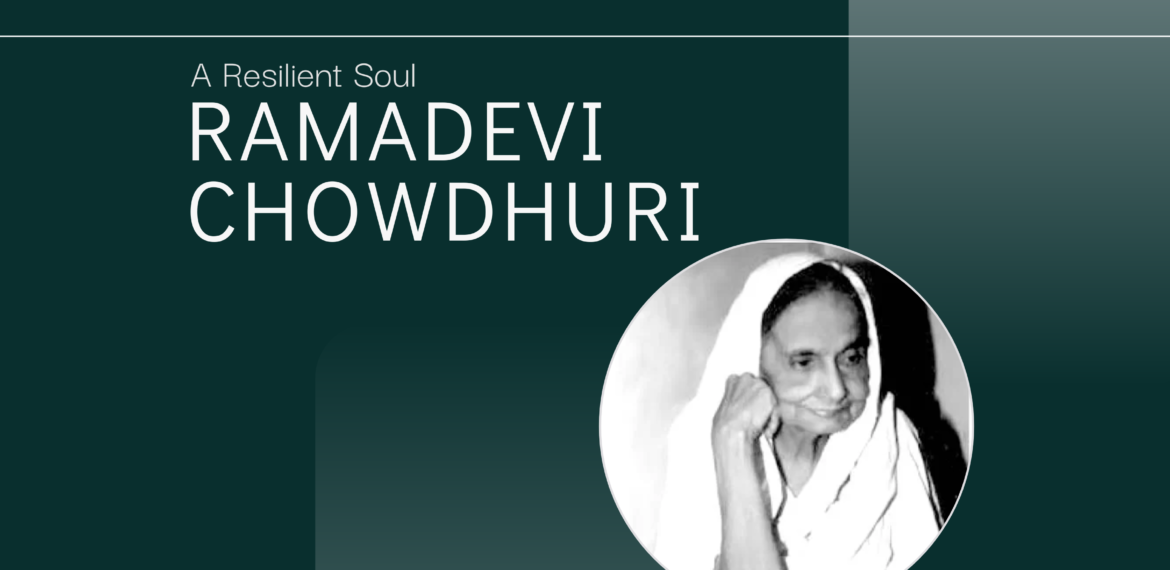Ramadevi Chowdhuri (1899-1985) was a prominent Indian freedom fighter and social activist from Odisha, India. Her dedication to the cause of women’s rights and active participation in the freedom struggle has made her an inspirational figure in Odisha and beyond. Ramadevi’s legacy continues to inspire generations of women to fight for their rights and contribute to society.
Ramadevi Chowdhuri was born to Basanta Kumari Devi and Gopal Ballav Das on December 3rd 1899 in Cuttack. She was the niece of Utkal Gaurab Madhusudhan Das, a lawyer and a social reformer who played a prominent role in the unification of Odisha. Her childhood was influenced by freedom fighters and thinkers like Mahatma Gandhi, Vinoba Bhave, Sri Aurobindo, and JP Narayan.
She got married at the early age of 15 to Gopabandhu Chowdhuri who resigned as Deputy Magistrate from Bariand, Odisha in 1921 prompting them to join the Indian Independence movement in 1921. The same year, they also joined Indian National Congress and actively participated in Non-Cooperation Movement.
She attended a meeting addressed by Mahatma Gandhi in Binod Bihari about the Swadeshi movement and resolved to wear only Khadi and indigenous clothes. This meeting in 1921 was the first public gathering of Odia women and also the first one addressed by a highly popular leader. It changed the life of Ramadevi Chowdhuri and many Odia women led by her into the Indian independence struggle.
She became a prominent leader in Odisha by the 1930s. She spearheaded the Salt Satyagraha movement and led the march with women in Srijanga and Kujanga. She campaigned door-to-door in many villages and encouraged women to participate in the freedom movement.
She was arrested in 1930 for her role in the Salt Satyagraha. She was later arrested again in 1932 for taking the Solemn Oath on January 26th for the country’s independence. But none of these arrests deterred her commitment to the women’s movement and the freedom struggle. In spite of her privileged Zamindari family background, she preferred to lead a simple life. She later founded Sevaghar at Ramachandrapur, Bari for social and economic upliftment. The activities at this Ashram included promoting Khadi, adult education, and self-employment opportunities through beekeeping, dairy development, and leather works.
She fought against untouchability through the institution Asprushyata Nibarana Samiti which was later renamed Harijan Sewa Sangha. She educated people about the need for the eradication of untouchability. She campaigned for the admission of Harijan children to schools. She led a team of women to train the Harijans about sanitation and nursing. She also helped Mahatma Gandhi with his padayatra for the eradication of untouchability from Puri to Bhadrak.
Her active participation in the Quit India movement led to her arrest along with other women leaders of Odisha. By the time of her release, her ashram was declared illegal by the British and was demolished. But her unwavering spirit motivated her to continue her efforts towards social reforms. Ramadevi did not just promote education but she also built 15 schools and conducted teacher training. She started hostels for children of the Congress workers and Harijans who were arrested by the British. She later on, became the in-charge of Kasturba Trust’s activities in Odisha.
She continued serving her people even after independence. She joined the Bhoodan movement of Vinoba Bhave and walked from village to village for 2000 miles to collect land gifts for the landless. She was associated with the Sarvodaya movement of Vinoba Bhave and presided over the All India Sarvodaya Convention held in Pandarpur.
She continued to help anyone in need during cyclones, floods, drought, communal riots, the Indo-China war and the Bangladesh war. She started a home for the orphaned and abandoned children in Kalhandi. She later started Balwadis to educate children in Odiya medium. She also founded a cancer detection centre in Cuttack.
She protested the curtailment of freedom of the press during the emergency by starting her own newspaper published by Gram Sevak Press. This publication was declared unlawful by the government and was closed subsequently.
As Gandhiji remarked, she and her team never knew what fatigue was and never claimed any special privilege. The Government Women’s College in Bhubaneswar was later renamed Rama Devi Women’s University after her. She was awarded the Jamnalal Bajaj Award for Development & Welfare of Women and Children in 1981 in recognition of her services. She was also awarded an honorary doctorate by Utkal University in 1964. This great soul, fondly called ‘Maa’ by the people of Odisha took her last breath on 22nd July 1985. But her efforts and institutions continue to support the needy and inspire the people even today.
References
About Rama Devi. Rama Devi Women’s University, Bhubaneshwar, Odisha.
Dr Chinmayee Satpathy, “Freedom Struggle and Rama Devi“. E-Magazines | Government of Odisha.
Ms Ramadevi Choudhary Recipient of Jamnalal Bajaj Award for Development & Welfare of Women and Children-1981. Jamnalal Bajaj Foundation.
Previous musing: Economics of Freedom (1965)


